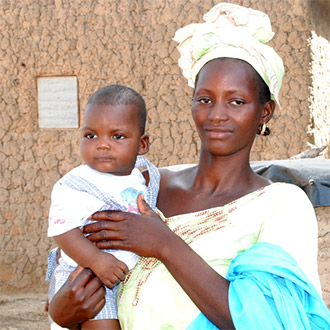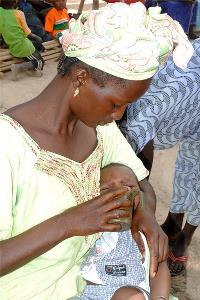
Three of Goundo’s children were eligible to participate in the SMC program during which anti-malarial medication helps protecting them from infection during peak transmission season. Photo credit: USAID/MCSP
In the region of Kayes, results of a pilot study have shown a dramatic reduction of malaria cases in the intervention districts when compared to control sites without SMC, as well as the case burden from the previous year.

Mother of four, Goundo, administers the first dose of SMC medicine to her son in Bendougouba. Photo credit: USAID/MCSP
Community health worker, Mariam Kébé, is ecstatic about the results in her community: “There has been a significant reduction in malaria cases among children. For example, after the first round of SMC in the Village of Toumoubougouni, 37 out of 45 children who consulted me tested positive for malaria. By the third round, I had only 3 positive cases!”
To reach as many children as possible in remote areas, it has been crucial to involve the community. Bendougouba, a health district approximately 12 kilometers from the regional capital of Kita, had an exemplary turn-out of residents, especially mothers, who participated in the SMC campaign.
Twenty-five-year-old mother, Goundo, is one of the highly motivated mothers who mobilized to bring their children to the campaign to prevent her children from getting malaria.
“Since the start of the campaign, none of my children has had malaria, which was not the case last year!” Goundo boasted. She added, “The campaign was really a good initiative for our community. We all mobilized together so that our children won’t get sick [with malaria]. [When our kids are healthy] it gives us more free time to do other important activities, and our husbands spend less money on medicines.”
Given the success of the program, an evaluation of the SMC intervention is currently underway to determine its relative usefulness as part of the overall malaria control strategy in Mali.
